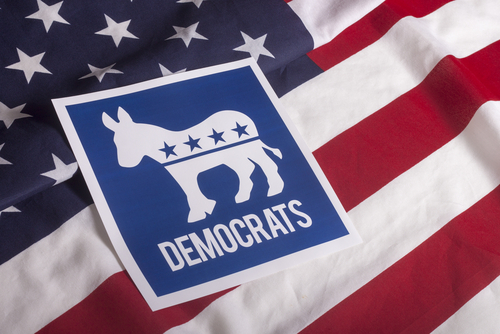The Democratic Party is embracing a bold new strategy dubbed “Dark Woke” to counter the dominant messaging of the Republican Party. This dramatic shift marks a departure from the traditional decorum of Democratic communication and embraces combative rhetoric, profanity, and personal attacks in a bid to recapture voter attention and challenge the appeal of Republican messaging.
Democrats Break Free from Political Decorum
In response to Donald Trump’s return to the White House, Democratic strategists are adopting an aggressive approach to politics, trading in the politeness of the past for a more provocative and confrontational style. The new “Dark Woke” messaging strategy is characterized by sharp criticisms of political opponents, bold language, and even strategic profanity. This shift, according to Democratic insiders, is designed to reclaim the initiative and engage voters more directly, mirroring the viral “Dark Brandon” memes that reimagined President Biden as a formidable figure.
What began as an online meme mocking Trump supporters during his inauguration has morphed into a legitimate political strategy. The term “Dark Woke” has grown beyond internet culture to represent a serious, albeit controversial, response to what many Democrats see as their party’s disadvantage in political communication. The approach draws from the provocative style of “dirtbag left” commentators, known for their unfiltered attacks and willingness to disregard political correctness.
💥THE DEMOCRATS ARE AN EVIL SATANISTIC REGIME – LOOK AT WHAT THEY HAVE DONE TO OUR COUNTRY💥THE DEMOCRAT PLAN, THE DEMOCRAT STRATEGY HAS BEEN FULLY EXPOSED 💥💥
DEMOCRATS ARE AN EVIL SATANISTIC REGIME😡 pic.twitter.com/TLPLP00Pr0
— 5DME81 (@5dme81) April 9, 2025
Breaking Out of the “Respectability Prison”
One of the key arguments behind the “Dark Woke” strategy is the notion that Democrats have been stuck in a “respectability prison,” where they are expected to adhere to traditional standards of decorum while Republicans are free to engage in unrestrained rhetoric. Communications consultant Bhavik Lathia has been outspoken in advocating for the shift, arguing that Democrats have been at a strategic disadvantage by limiting themselves to more restrained forms of political discourse.
“Republicans have essentially put Democrats in a respectability prison,” Lathia said. “There is an extreme imbalance in strategy that allows Republicans to say stuff that really grabs voters’ attention, where we’re stuck saying boring pablum. I see this as a strategic shift within Democratic messaging—I’m a big fan of ‘dark woke.’”
The Democrats' hypocrisy knows no bounds. They scream about 'saving democracy' while trying to jail their political rivals.
They push extreme policies like open borders and defunding police, then act shocked when crime spikes and communities suffer.
Their woke agenda demands… pic.twitter.com/cfPiTFBvW2
— Erica 🇺🇸🇺🇸🇺🇸 (@EricaRN4USA) March 22, 2025
From Meme to Political Strategy
The term “Dark Woke” may have started as an online meme, but it has now firmly established itself within the Democratic political toolbox. This approach is designed to resonate with younger voters, particularly those who are active on social media, where combative and even offensive language often dominates political discussions. Elements of this strategy have already been rolled out in Senate campaigns, including the “Sh– That Is Not True” campaign that criticizes Trump’s false statements, and Representative Jasmine Crockett’s fiery rhetoric against Republicans like Rep. Marjorie Taylor Greene.
While proponents of the strategy see it as a necessary evolution in messaging, especially in a social media age dominated by attention-grabbing rhetoric, it raises important questions about its broader appeal.
Potential Risks of the “Dark Woke” Strategy
The “Dark Woke” strategy is not without its risks. The aggressive tone, profanity, and combative style could alienate moderate voters, as well as older, more conservative-leaning independents who may not appreciate the harsh rhetoric. Critics argue that while the strategy might work in the digital space and among younger voters, it may fail to translate into broader electoral success, particularly in swing states where voters are less receptive to uncivil discourse.
Moreover, there are concerns that this style of messaging could contribute to the degradation of political discourse, fueling even more partisan hostility. By embracing the “crass” and “rude” elements of the “Dark Woke” approach, Democratic strategists risk further dividing the electorate and deepening the ideological rift between the parties.
While this new messaging strategy may energize the Democratic base, questions remain about whether it will ultimately prove effective in national elections where broader appeal is needed to secure victory. Only time will tell whether “Dark Woke” is a passing trend or a permanent shift in Democratic political communication.

